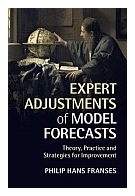|
||
• wydawnictwa polskie
• Zamów informacje o nowościach z wybranego tematu • kontakt
• Cookies na stronie |
EXPERT ADJUSTMENTS OF MODEL FORECASTSFRANCES PH.H.wydawnictwo: CAMBRIDGE , rok wydania 2014, wydanie Icena netto: Expert Adjustments of Model ForecastsTo what extent should anybody who has to make model forecasts generated from detailed data analysis adjust their forecasts based on their own intuition? In this book, Philip Hans Franses, one of Europe's leading econometricians, presents the notion that many publicly available forecasts have experienced an 'expert's touch', and questions whether this type of intervention is useful and if a lighter adjustment would be more beneficial. Covering an extensive research area, this accessible book brings together current theoretical insights and new empirical results to examine expert adjustment from an econometric perspective. The author's analysis is based on a range of real forecasts and the datasets upon which the forecasters relied. The various motivations behind experts' modifications are considered, and guidelines for creating more useful and reliable adjusted forecasts are suggested. This book will appeal to academics and practitioners with an interest in forecasting methodology. Advance praise: 'All economic and business forecasting involves judgment to some extent, but most books focus on the application of statistical methods. At last we have a book that directly addresses the role of judgment in forecasting and applies a set of rigorous methods to assess its potential strengths and limitations.' Paul Goodwin, Emeritus Professor, University of Bath Advance praise: 'This monograph is an important substantial analysis of a crucial aspect of forecasting practice that is often treated far too casually. Expert interventions on model-based forecasts are ubiquitous, but rarely subject to formal analysis. This book will be valuable in practice and a stimulus to researchers.' Derek Bunn, London Business School Preface; 1. Introduction; 2. Optimal behavior of experts; 3. Observed behavior of experts; 4. How accurate are expert-adjusted forecasts?; 5. How can forecasts be improved?; 6. Conclusion, limitations and implications; Data appendix; References; Index. 143 pages, Paperback Księgarnia nie działa. Nie odpowiadamy na pytania i nie realizujemy zamówien. Do odwolania !. |


